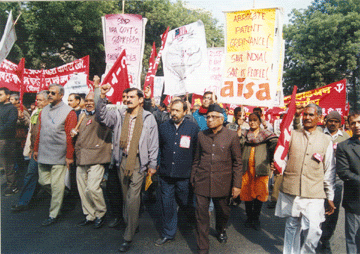 People's Democracy
People's Democracy
(Weekly
Organ of the Communist Party of India (Marxist)
No. 02
January 09, 2005
(Weekly
Organ of the Communist Party of India (Marxist)
|
Vol.
XXIX
No. 02 January 09, 2005 |
Movement Launched Against Patents Ordinance

M K Pandhe and others leading the demonstration in front of parliament
THE
strong opposition to the amendment of Indian Patents Act found expression in the
first public protest held by the Joint Action Committee in New Delhi on January
5. Several hundreds of workers, students and youth held a dharna before
parliament demanding the UPA government to rescind the ordinance it issued
effecting the amendment.
The
‘Joint Action Committee Against Amendment of Indian
Patents Act’, which comprises of central trade unions, industrial and
employees federations and mass organisations of peasants, agricultural workers,
students, youth women, and science forums called for this demonstration to
record its emphatic protest against the Third Amendment Ordinance on Patents Act
recently promulgated by the UPA government.
The
demonstration was addressed by M K Pandhe, CITU president, Tapan Sen, CITU
secretary, Abani Roy, MP (UTUC), Santosh Ray (AICCTU)
Ram Pratap Sharma (TUCC), S P Shukla, former member of Planning
Commission, Prasenjeet Bose (SFI) Kavita Krishnan (AISA), V P Saini (Kisan Sabha),
B Mani (FMRAI) and others.
Stating
that the proposed legislation replacing the ordinance is likely to come up in
the next budget session, M K Pandhe warned it would ''spell a disaster'' for the
country's industrial and agricultural sector. He asserted the Left organisations
would stage a massive demonstration to voice their protest on the second day of
the budget session next month.
Coming
down heavily on the UPA government for ''ignoring the country's interests'', the
speakers at the demonstration alleged that
the change in the present patent regime was being initiated
without proper safeguards for the country's agriculture and
industry, particularly the pharmaceutical sector.
The
speakers called upon the toiling people to unitedly oppose this ordinance and
build up a powerful movement countrywide to defeat the ordinance and force such
changes in the patent regime which would adequately take care of the interests
of the people and the domestic economy.
The
Joint Action Committee firmly maintained that the patents ordinance resulting in
a change over to product patent regime will severely affect the Indian
industries and agriculture, particularly spelling doom for the domestic
pharmaceutical industry and the agricultural sector. It is against the interest
of the national economy and the people at large and is going to empower the
foreign MNCs to dominate the Indian economy. It is going to affect health care
of the common people by making medicine prices unaffordable. (INN)